Traffic | ||
| Allmusic Biography : Though it ultimately must be considered an interim vehicle for singer/songwriter/keyboardist/guitarist Steve Winwood, Traffic was a successful group that followed its own individual course through the rock music scene of the late 60s and early 70s. Beginning in the psychedelic year of 1967 and influenced by the Beatles, the band turned out eclectic pop singles in its native Great Britain, though by the end of its first year of existence it had developed a pop/rock hybrid tied to its unusual instrumentation: At a time when electric guitars ruled rock, Traffic emphasized Winwoods organ and the reed instruments played by Chris Wood, especially flute. After Dave Mason, who had provided the band with an alternate folk-pop sound, departed for good, Traffic leaned toward extended songs that gave its players room to improvise in a jazz-like manner, even as the rhythms maintained a rock structure. The result was international success that ended only when Winwood finally decided he was ready to strike out on his own. Steve Winwood (born May 12, 1948) first attracted attention when, at the age of 15, he and his older brother Muff formed a band in their native Birmingham, England, with Spencer Davis and Pete York, eventually called the Spencer Davis Group. They were signed by record executive Chris Blackwell, founder of Island Records, and began recording in 1964. As the bands vocalist, Winwood received the lions share of attention. By the time he and his brother quit the group in April 1967, the Spencer Davis Group had amassed four Top Ten singles and three Top Ten albums in the U.K., two of those singles also reaching the Top Ten in the U.S. Still not yet 19 years old, Winwood formed Traffic with three 22-year-old friends who had played in lesser-known bands: drummer/singer Jim Capaldi (August 24, 1944 - January 28, 2005), singer/guitarist Mason (born May 10, 1944), and Wood (June 24, 1944 - July 12, 1983). In the spirit of the times (and despite Winwoods prominence), the group was intended to be a cooperative, with the members living together in a country cottage in Berkshire and collaborating on their songs. Blackwell quickly signed them and released their debut single, "Paper Sun," which peaked in the U.K. Top Five in July 1967 and also spent several weeks in the lower reaches of the charts in America, where Blackwell licensed it to United Artists, as he had the Spencer Davis Groups recordings. Meanwhile, as Traffic recorded material for its debut album during the summer of 1967, its communal outlook was disrupted by Mason, who, unlike Winwood (a composer who needed help with lyrics and therefore tended toward collaboration), was capable of writing songs on his own and did so. The success of "Paper Sun" encouraged Blackwell to release a follow-up single quickly, and he chose "Hole in My Shoe" (written and sung by Mason) as the most likely candidate among the songs Traffic had recorded so far. It became an even bigger hit than "Paper Sun," almost topping the British charts in October, but that didnt sit well with Winwood, who felt it was unrepresentative of the sound he wanted for Traffic. The groups third single was "Here We Go Round the Mulberry Bush," the title song from a motion picture, which became their third British Top Ten hit in December, the same month that their debut album, Mr. Fantasy, was released. It, too, earned a Top Ten ranking in January 1968, but by then Mason had left Traffic. A fourth single, "No Face, No Name, No Number," culled from the album, made the British Top 40 in March, the month that Traffic debuted as a live attraction in the U.S., where Mr. Fantasy (initially titled Heaven Is in Your Mind) reached the Top 100. Traffic encountered two problems as a trio. First, given its unusual instrumentation, it had difficulty on-stage doing without a player like Mason, who could handle the bass guitar work. In his absence, Winwood was forced to fill in the bass sound by playing the organs bass pedals with his feet while simultaneously playing the organ keyboards with his hands and singing. Second, without a prolific writer like Mason, the group had more difficulty coming up with enough new material to satisfy its contractual commitments. As a result, Winwood, Capaldi, and Wood reconciled with Mason, who rejoined Traffic in the spring of 1968 and contributed heavily to the bands second album, Traffic, writing half of the songs, among them "Feelin Alright?," which went on to become a rock standard, particularly after Joe Cockers 1969 cover version became an American Top 40 hit in 1972. Traffic was released in October 1968, and the band went on tour in the U.S. to promote it. But just after the start of the tour, Winwood, Capaldi, and Wood fired Mason. Then, at the conclusion of the tour, Winwood withdrew, announcing the breakup of Traffic at the beginning of 1969. These events notwithstanding, the album reached the U.K. Top Ten and the U.S. Top 20. And breakup or no, Winwood was contracted to Island and United Artists for five albums, of which only two had been delivered. Thus, in April 1969, the labels released Last Exit, a collection of non-LP singles sides, outtakes, and live recordings. It was another Top 20 success in America. Meanwhile, Capaldi and Wood rejoined Mason along with keyboardist Wynder K. Frog in the short-lived band Wooden Frog, which never recorded, and Winwood teamed with former Cream members Eric Clapton and Ginger Baker as well as former Family member Ric Grech (November 1, 1946 - March 16, 1990) in Blind Faith. This highly touted supergroup made one album, Blind Faith, which topped the charts in the U.S. and U.K., and played one American tour before breaking up. Still owing his record labels two albums, Winwood began work on a solo record in early 1970, but quickly brought in Capaldi and Wood and turned it into a Traffic LP. John Barleycorn Must Die was released in June 1970. In the U.S., it was a gold-selling Top Ten hit; in the U.K. it reached the Top 20. Embarking on extensive touring, Traffic expanded its lineup, adding Ric Grech on bass. In the spring of 1971, in anticipation of British and American touring, drummer Jim Gordon, formerly of Derek and the Dominos, was brought in, as was percussionist Reebop Kwaku Baah. Also joining for a handful of U.K. dates was Dave Mason, who had in the meantime become a solo star with his 1970 album Alone Together. The band was able to work off its contractual commitment with a live album from this lineup, Welcome to the Canteen, released in September. Although it failed to make the U.K. charts, it reached the Top 40 in America. Re-signed to Island, which began releasing albums in the U.S. as well as the U.K., Traffic quickly followed in November with the studio album The Low Spark of High Heeled Boys, which reached the American Top Ten and sold a million copies, though, in an indication of the groups increasingly international focus, didnt even chart back home in Britain. A winter 1971-1972 tour was aborted by Winwoods poor health (he was later revealed to be suffering from peritonitis), and Grech and Gordon left the band, while Capaldi recorded his debut solo album, Oh How We Danced; it reached the American Top 100. In the fall of 1972, with Winwood recovered, Traffic convened to record a new album, adding drummer Roger Hawkins and bassist David Hood, members of the studio band at the famed Muscle Shoals recording studio. (Keyboardist Barry Beckett, another Muscle Shoals alumnus, played with the band live.) Shoot Out at the Fantasy Factory, released in January 1973, reached the American Top Ten and went gold. The world tour that promoted it was chronicled on Traffic: On the Road, released in October 1973. At the end of the tour, the Muscle Shoals musicians returned home and Kwaku Baah also left Traffic, which recruited bassist Rosko Gee. Capaldi released a second solo album, Whale Meat Again, in the summer of 1974; "Its All up to You" from it reached the U.K. Top 40. With Traffic, he recorded a new album, When the Eagle Flies, released in September. It was the bands fourth consecutive studio album to reach the American Top Ten and go gold, and the group toured to support it, but at the conclusion of the tour Traffic silently disbanded. With a headstart on a solo career, Capaldi scored a Top Five hit in the U.K. in 1975 with a cover of "Love Hurts" from his third album, Short Cut Draw Blood. (The single charted in the U.S., but lost out to a competing version by Nazareth.) Along with former Santana drummer Michael Shrieve, Winwood participated prominently in Japanese percussionist Stomu Yamashtas concept album Go, which made the Top 100 in the U.S. in 1976. In 1977, he finally made his solo bow, releasing the modestly successful album Steve Winwood. A three-and-a-half year silence ensued, broken by the 1980 release of Arc of a Diver, which hit the American Top Five and went platinum, paced by the Top Ten single "While You See a Chance." 1982s Talking Back to the Night was a commercial disappointment, but Winwood had the greatest success of his career with 1986s Back in the High Life, a multi-million seller that threw off four Top 20 singles, among them the chart-topping "Higher Love." In 1987, "Valerie," a remixed version of a song from Talking Back to the Night, hit the Top Ten. 1988s Roll With It was another multi-platinum seller for Winwood, with both the album and the title song topping the charts. But Refugees of the Heart (1990) was less successful. In 1994, Winwood announced a reunion with Capaldi (Wood had died of liver failure), who had continued to record solo albums with diminishing success. The two made a new album, Far from Home, and toured as Traffic during the summer. The album quickly reached the U.S. and U.K. Top 40, but did not sell well, and the tour also performed disappointingly, signaling another retirement of the Traffic name. Nevertheless, the 1967-1974-era band continued to enjoy significant status as a classic rock act, its albums earning CD reissues along with the release of compilations like Smiling Phases (1991) and Feelin Alright: The Very Best of Traffic (2000). Capaldis death on January 28, 2005, appeared to put an end to the band. | ||
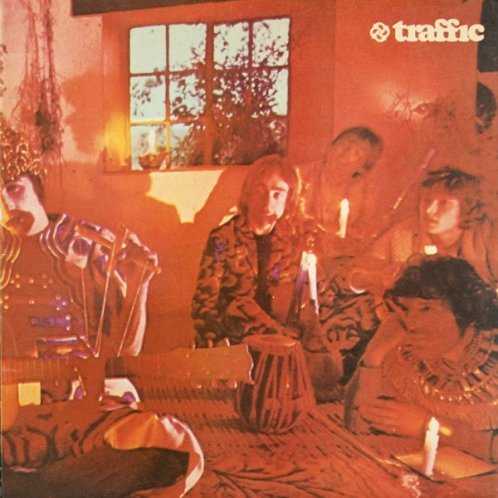 | Album: 1 of 21 Title: Mr. Fantasy Released: 1967-12 Tracks: 10 Duration: 34:27 Scroll: Up Down Top Bottom 25% 50% 75% Spotify Wikipedia Allmusic AlbumCover | 1 Paper Sun (04:15) 2 Dealer (03:12) 3 Coloured Rain (02:43) 4 Hole in My Shoe (03:03) 5 No Face, No Name, No Number (03:33) 6 House for Everyone (02:04) 7 Berkshire Poppies (02:58) 8 Giving to You (04:17) 9 Smiling Phases (02:42) 10 Dear Mr. Fantasy (05:37) |
| Mr. Fantasy : Allmusic album Review : Since Traffics debut album, Mr. Fantasy, has been issued in different configurations over the years, a history of those differences is in order. In 1967, the British record industry considered albums and singles separate entities; thus, Mr. Fantasy did not contain the groups three previous Top Ten U.K. hits. Just as the album was being released in the U.K., Traffic split from Dave Mason. The album was changed drastically for U.S. release, both because American custom was that singles ought to appear on albums, and because the group sought to diminish Masons presence; on the first pressing only, the title was changed to Heaven Is in Your Mind. In 2000, Island reissued Mr. Fantasy in its mono mix with the U.K. song list and five mono singles sides as bonus tracks; it also released Heaven Is in Your Mind, the American lineup in stereo with four bonus tracks. Naturally, the mono sound is punchier and more compressed, but it isnt ideal for the album, because Traffic was fashioned as an unusual rock band. Steve Winwoods primary instrument was organ, though he also played guitar; Chris Wood was a reed player, spending most of his time on flute; Mason played guitar, but he was also known to pick up the sitar, among other instruments. As such a mixture suggests, the bands musical approach was eclectic, combining their background in British pop with a taste for the comic and dance hall styles of Sgt. Pepper, Indian music, and blues-rock jamming. Songs in the last category have proven the most distinctive and long-lasting, but Masons more pop-oriented contributions remain winning, as do more light-hearted efforts. Interest in the mono mix is likely to be restricted to longtime fans; anyone wishing to hear Traffics first album for the first time is directed to Heaven Is in Your Mind. | ||
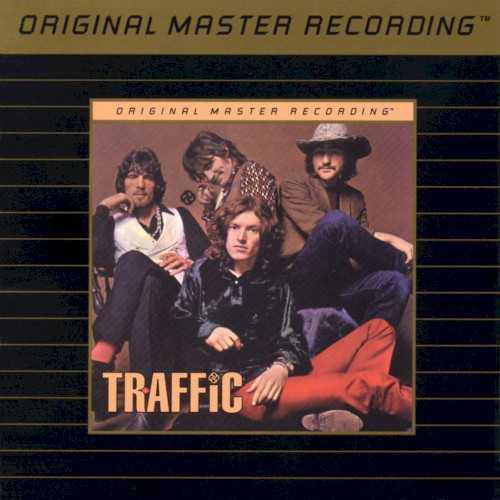 | Album: 2 of 21 Title: Traffic Released: 1968-10 Tracks: 15 Duration: 57:37 Scroll: Up Down Top Bottom 25% 50% 75% Spotify TrackSamples Wikipedia Allmusic AlbumCover | 1 You Can All Join In (03:37) 2 Pearly Queen (04:20) 3 Don’t Be Sad (03:25) 4 Who Knows What Tomorrow May Bring (03:14) 5 Feelin’ Alright (04:18) 6 Vagabond Virgin (05:22) 7 Forty Thousand Headmen (03:15) 8 Cryin’ to Be Heard (05:12) 9 No Time to Live (05:20) 10 Means to an End (02:35) 11 Here We Go Round the Mulberry Bush (02:40) 12 Am I What I Was or Am I What I Am (02:34) 13 Withering Tree (B-Side of “Feelin’ Alright?”) (02:56) 14 Medicated Goo (03:36) 15 Shanghai Noodle Factory (05:06) |
| Traffic : Allmusic album Review : After dispensing with his services in December 1967, the remaining members of Traffic reinstated Dave Mason in the group in the spring of 1968 as they struggled to write enough material for their impending second album. The result was a disc evenly divided between Masons catchy folk-rock compositions and Steve Winwoods compelling rock jams. Masons material was the most appealing both initially and eventually: the lead-off track, a jaunty effort called "You Can All Join In," became a European hit, and "Feelin Alright?" turned out to be the only real standard to emerge from the album after it started earning cover versions from Joe Cocker and others in the 1970s. Winwoods efforts, with their haunting keyboard-based melodies augmented by Chris Woods reed work and Jim Capaldis exotic rhythms, work better as musical efforts than lyrical ones. Primary lyricist Capaldis words tend to be impressionistic reveries or vague psychological reflections; the most satisfying is the shaggy-dog story "Forty Thousand Headmen," which doesnt really make any sense as anything other than a dream. But the lyrics to Winwood/Capaldi compositions take a back seat to the playing and Winwoods soulful voice. As Masons simpler, more direct performances alternate with the more complex Winwood tunes, the album is well-balanced. Its too bad that the musicians were not able to maintain that balance in person; for the second time in two albums, Mason found himself dismissed from the group just as an LP to which hed made a major contribution hit the stores. Only a few months after that, the band itself split up, but not before scoring their second consecutive Top Ten ranking in the U.K.; the album also reached the Top 20 in the U.S., breaking the temporarily defunct group stateside. | ||
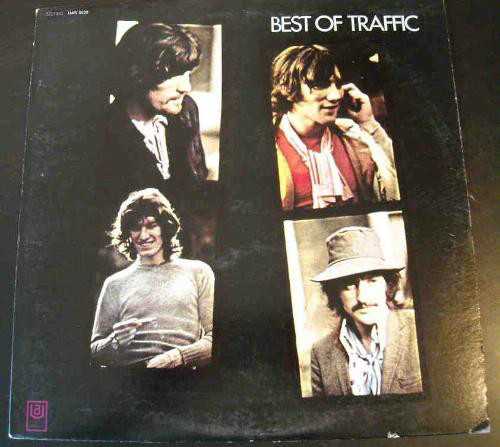 | Album: 3 of 21 Title: Best of Traffic Released: 1969 Tracks: 11 Duration: 42:29 Scroll: Up Down Top Bottom 25% 50% 75% Spotify Wikipedia AlbumCover | 1 Paper Sun (04:15) 2 Heaven Is in Your Mind (04:18) 3 No Face, No Name, No Number (03:33) 4 Coloured Rain (02:43) 5 Smiling Phases (02:42) 6 Hole in My Shoe (03:03) 7 Medicated Goo (03:36) 8 Forty Thousand Headmen (03:15) 9 Feelin’ Alright (04:18) 10 Shanghai Noodle Factory (05:06) 11 Dear Mr. Fantasy (05:37) |
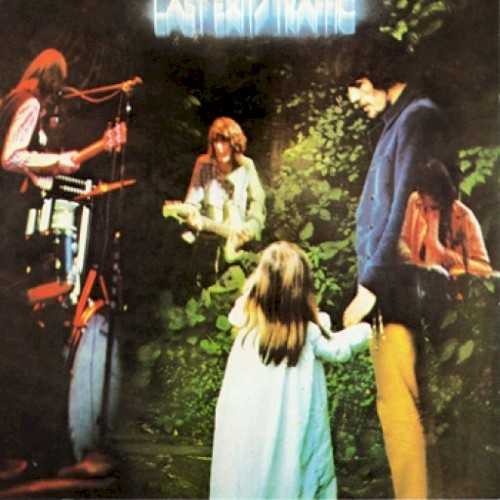 | Album: 4 of 21 Title: Last Exit Released: 1969-05 Tracks: 7 Duration: 34:17 Scroll: Up Down Top Bottom 25% 50% 75% Spotify Wikipedia Allmusic AlbumCover | 1 Just for You (02:17) 2 Shanghai Noodle Factory (05:06) 3 Something’s Got a Hold of My Toe (02:14) 4 Withering Tree (03:04) 5 Medicated Goo (03:36) 6 Feelin’ Good (10:43) 7 Blind Man (live) (07:14) |
| Last Exit : Allmusic album Review : Since Traffic originally planned its self-titled second album as a double LP, the group had extra material left over, some of which saw release before the end of 1968 (there was a new, one-off single released in December, "Medicated Goo"/"Shanghai Noodle Factory"). In January 1969, Steve Winwood announced the groups breakup. That left Island Records, the bands label, in the lurch, since Traffic had built up a considerable following. As far as Island was concerned, it was no time to stop, and the label quickly set about assembling a new album. The non-LP B-side "Withering Tree," "Medicated Goo," and "Shanghai Noodle Factory" were pressed into service, along with "Just for You," the B-side of a solo single by on-again, off-again member Dave Mason that had been released originally in February 1968 and happened to feature the rest of the members of Traffic as sidemen; a short, previously unreleased instrumental; and two extended jams on cover songs from a 1968 live appearance at the Fillmore West. It all added up to more than half an hour of music, and that was enough to package it as the posthumous Traffic album Last Exit. Actually, Last Exit isnt bad as profit-taking products go. "Just for You" is one of Masons elegant folk-pop songs, including attractive Indian percussion. "Medicated Goo" has proven to be one of Traffics more memorable jam tunes, despite its nonsense lyrics, and the equally appealing "Shanghai Noodle Factory" is hard not to interpret as Winwoods explanation of the bands split. And while the cover material seems unlikely, the songs are used as platforms for the band to jam cohesively. So, Traffics third album, thought at the time of its release to be the final one, has its isolated pleasures, even if it doesnt measure up to its two predecessors. | ||
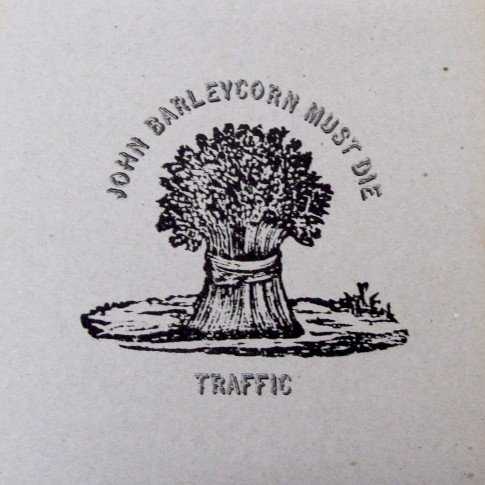 | Album: 5 of 21 Title: John Barleycorn Must Die Released: 1970-07 Tracks: 6 Duration: 34:31 Scroll: Up Down Top Bottom 25% 50% 75% Spotify TrackSamples Wikipedia Allmusic AlbumCover | 1 Glad (06:59) 2 Freedom Rider (05:29) 3 Empty Pages (04:36) 4 Stranger to Himself (03:55) 5 John Barleycorn (06:24) 6 Every Mother’s Son (07:06) |
| John Barleycorn Must Die : Allmusic album Review : At only 22 years old, Steve Winwood sat down in early 1970 to fulfill a contractual commitment by making his first solo album, on which he intended to play all the instruments himself. The record got as far as one backing track produced by Guy Stevens, "Stranger to Himself," before Winwood called his erstwhile partner from Traffic, Jim Capaldi, in to help out. The two completed a second track, "Every Mothers Son," then, with Winwood and Island Records chief Chris Blackwell moving to the production chores, brought in a third Traffic member, Chris Wood, to work on the sessions. Thus, Traffic, dead and buried for more than a year, was reborn. The bands new approach was closer to what it perhaps should have been back in 1967, basically a showcase for Winwoods voice and instrumental work, with Wood adding reed parts and Capaldi drumming and occasionally singing harmony vocals. If the original Traffic bowed to the perceived commercial necessity of crafting hit singles, the new Traffic was more interested in stretching out. Heretofore, no studio recording had run longer than the five-and-a-half minutes of "Dear Mr. Fantasy," but four of the six selections on John Barleycorn Must Die exceeded six minutes. Winwood and company used the time to play extended instrumental variations on compelling folk- and jazz-derived riffs. Five of the six songs had lyrics, and their tone of disaffection was typical of earlier Capaldi sentiments. But the vocal sections of the songs merely served as excuses for Winwood to exercise his expressive voice as punctuation to the extended instrumental sections. As such, John Barleycorn Must Die moved beyond the jamming that had characterized some of Traffics 1968 work to approach the emerging field of jazz-rock. And that helped the band to achieve its commercial potential; this became Traffics first gold album. | ||
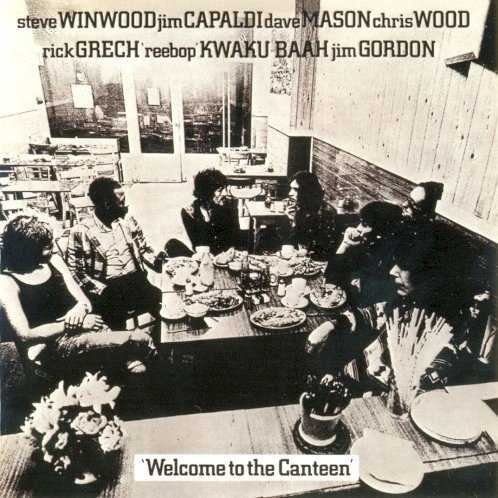 | Album: 6 of 21 Title: Welcome to the Canteen Released: 1971-09-01 Tracks: 6 Duration: 39:20 Scroll: Up Down Top Bottom 25% 50% 75% Spotify Allmusic Wikipedia AlbumCover | 1 Medicated Goo (03:34) 2 Sad and Deep as You (03:48) 3 40,000 Headmen (06:21) 4 Shouldn’t Have Took More Than You Gave (05:39) 5 Dear Mr. Fantasy (10:56) 6 Gimme Some Lovin’ (09:01) |
| Welcome to the Canteen : Allmusic album Review : Following the success of John Barleycorn Must Die, Traffic planned a concert album for the fall of 1970, and it got as far as a test pressing before being canceled. A recording was necessary to satisfy the terms of British label Island records licensing deal with American label United Artists, which had provided for five albums, of which four had been delivered. With Island starting to release its own albums in the U.S., the UA contract had to be completed, and hopefully not with the potentially lucrative studio follow-up to John Barleycorn Must Die. Thus, Traffic tried again to come up with a live album by recording shows on a British tour in July 1971. Joining for six dates of the tour was twice-dismissed Traffic singer/guitarist Dave Mason, who had subsequently scored a solo success with his Alone Together album. The resulting collection, Welcome to the Canteen (which was technically credited to the seven individual musicians, not to Traffic), proved how good a contractual obligation album could be. Sound quality was not the best, with the vocals under-recorded and stray sounds honing in, but the playing was exemplary, and the set list was an excellent mixture of old Traffic songs and recent Mason favorites. "Dear Mr. Fantasy" got an extended workout, and the capper was a rearranged version of Steve Winwoods old Spencer Davis Group hit "Gimme Some Lovin." Welcome to the Canteens status as only a semi-legitimate offering was emphasized by the release, after a mere two months, of a new Traffic studio album on Island (The Low Spark of High Heeled Boys) that undercut its sales. But that doesnt make it any less appealing as a summing up of the Winwood/Mason/Traffic musical world. | ||
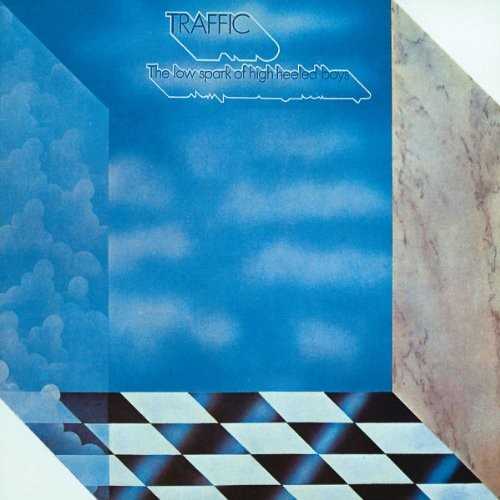 | Album: 7 of 21 Title: The Low Spark of High Heeled Boys Released: 1971-11 Tracks: 6 Duration: 39:52 Scroll: Up Down Top Bottom 25% 50% 75% Spotify Wikipedia Allmusic AlbumCover | 1 Hidden Treasure (04:11) 2 The Low Spark of High Heeled Boys (11:40) 3 Light Up or Leave Me Alone (04:46) 4 Rock and Roll Stew (04:21) 5 Many a Mile to Freedom (07:14) 6 Rainmaker (07:38) |
| The Low Spark of High Heeled Boys : Allmusic album Review : The Low Spark of High Heeled Boys marked the commercial and artistic apex of the second coming of Traffic, which had commenced in 1970 with John Barleycorn Must Die. The trio that made that album had been augmented by three others (Ric Grech, Jim Gordon, and "Reebop" Kwaku Baah) in the interim, though apparently the Low Spark sessions featured varying combinations of these musicians, plus some guests. But where their previous album had grown out of sessions for a Steve Winwood solo album and retained that focus, Low Spark pointedly contained changes of pace from his usual contributions of midtempo, introspective jam tunes. "Rock & Roll Stew" was an uptempo treatise on life on the road, while Jim Capaldis "Light up or Leave Me Alone" was another more aggressive number with an unusually emphatic Capaldi vocal that perked things up on side two. The other four tracks were Winwood/Capaldi compositions more in the bands familiar style. "Hidden Treasure" and "Rainmaker" bookended the disc with acoustic treatments of nature themes that were particularly concerned with water, and "Many a Mile to Freedom" also employed water imagery. But the standout was the 12-minute title track, with its distinctive piano riff and its lyrics of weary disillusionment with the music business. The band had only just fulfilled a contractual commitment by releasing the live album Welcome to the Canteen, and they had in their past the embarrassing Last Exit album thrown together as a commercial stopgap during a temporary breakup in 1969. But that anger had proven inspirational, and "The Low Spark of High Heeled Boys" was one of Traffics greatest songs as well as its longest so far. The result was an album that quickly went gold (and eventually platinum) in the U.S., where the group toured frequently. | ||
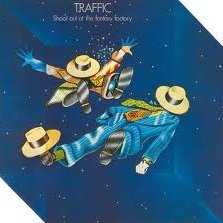 | Album: 8 of 21 Title: Shoot Out at the Fantasy Factory Released: 1973-02 Tracks: 5 Duration: 37:13 Scroll: Up Down Top Bottom 25% 50% 75% Spotify Wikipedia Allmusic AlbumCover | 1 Shoot Out at the Fantasy Factory (06:05) 2 Roll Right Stones (11:46) 3 Evening Blue (05:19) 4 Tragic Magic (06:43) 5 (Sometimes I Feel So) Uninspired (07:19) |
| Shoot Out at the Fantasy Factory : Allmusic album Review : After two exemplary releases, Shoot Out at the Fantasy Factory marked a fall-off in quality for Traffic. The problems lay in both composition and performance. Beginning with the title track, based on a guitar riff reminiscent of the recent Deep Purple hit "Smoke on the Water," and continuing through the lengthy "Roll Right Stones," the folkish ballad "Evening Blue," reed player Chris Woods instrumental "Tragic Magic," and the uncertain self-help song "(Sometimes I Feel So) Uninspired," the material was far from the groups best. Lyricist Jim Capaldi was co-credited with Steve Winwood as the albums producer, and he may have contributed to the cleaner mix that made his words easier to understand. Easier, that is, in the technical sense, since the musing about a sort of minor-league Stonehenge "Roll Right Stones" didnt do much with the image, and, though it struggled for a more positive outlook, "(Sometimes I Feel So) Uninspired" seemed to come out on the side of despair. Winwoods music seemed to recycle his own ideas when it didnt borrow from others. Meanwhile, the rhythm section had been replaced by Muscle Shoals studio aces David Hood and Roger Hawkins, who proved proficient but not as kinetic as their predecessors, so that the playing often seemed mechanical. Capaldi sang no songs here, and Woods flute and saxophone, so often the flavoring of Traffic songs, were largely absent. What was left was a competent, if perfunctory effort in the bands familiar style. They had built up enough of a following through touring that the album was a commercial success, but it sounds like an imitation of earlier triumphs. | ||
![Allmusic album Review : Reportedly released as an effort to undercut bootleggers following a world tour, Traffic: On the Road was the bands second live album in three years. The album chronicled a late edition of the band in which original members Steve Winwood, Jim Capaldi, and Chris Wood were augmented not only by percussionist Reebop Kwaku Baah, but also by a trio of session musicians from the famed Muscle Shoals studio, Roger Hawkins, David Hood, and Barry Beckett. The studio pros lent a tightness and proficiency to their characteristic free-form jams, and though they sometimes sounded like they couldnt wait to get the songs over with, the tunes went on and on, four clocking in at over ten minutes. That might have been okay if the choice of material had been more balanced across the bands career, but 1971s Welcome To the Canteen had treated earlier efforts, and the 1973 tour was promoting Shoot Out At the Fantasy Factory, from which three of the six selections were drawn. Unfortunately, that album was not one of Traffics best, and the live versions of its songs were no more impressive than the studio ones had been. Traffic: On the Road featured plenty of room for soloing by some good musicians, but it was the logical extreme of the bands forays into extended performance, with single tunes taking up entire sides on the original LPs. Its not surprising that, after this, Traffic shrunk in size and returned to shorter songs. [Though best known in its two-LP version, Traffic: On the Road was initially released in the U.S. as a single LP containing only four tracks.] on_the_road](../../images/traffic-on_the_road.jpg) | Album: 9 of 21 Title: On the Road Released: 1973-10 Tracks: 7 Duration: 1:15:04 Scroll: Up Down Top Bottom 25% 50% 75% Spotify Allmusic Wikipedia AlbumCover | 1 Glad (15:55) 2 Freedom Rider (05:34) 3 Tragic Magic (08:30) 4 (Sometimes I Feel So) Uninspired (10:20) 1 Shoot Out at the Fantasy Factory (06:40) 2 Light Up or Leave Me Alone (10:30) 3 The Low Spark of High Heeled Boys (17:35) |
| On the Road : Allmusic album Review : Reportedly released as an effort to undercut bootleggers following a world tour, Traffic: On the Road was the bands second live album in three years. The album chronicled a late edition of the band in which original members Steve Winwood, Jim Capaldi, and Chris Wood were augmented not only by percussionist Reebop Kwaku Baah, but also by a trio of session musicians from the famed Muscle Shoals studio, Roger Hawkins, David Hood, and Barry Beckett. The studio pros lent a tightness and proficiency to their characteristic free-form jams, and though they sometimes sounded like they couldnt wait to get the songs over with, the tunes went on and on, four clocking in at over ten minutes. That might have been okay if the choice of material had been more balanced across the bands career, but 1971s Welcome To the Canteen had treated earlier efforts, and the 1973 tour was promoting Shoot Out At the Fantasy Factory, from which three of the six selections were drawn. Unfortunately, that album was not one of Traffics best, and the live versions of its songs were no more impressive than the studio ones had been. Traffic: On the Road featured plenty of room for soloing by some good musicians, but it was the logical extreme of the bands forays into extended performance, with single tunes taking up entire sides on the original LPs. Its not surprising that, after this, Traffic shrunk in size and returned to shorter songs. [Though best known in its two-LP version, Traffic: On the Road was initially released in the U.S. as a single LP containing only four tracks.] | ||
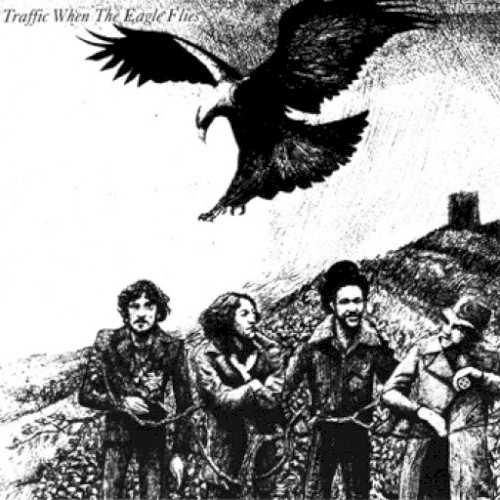 | Album: 10 of 21 Title: When the Eagle Flies Released: 1974 Tracks: 7 Duration: 39:51 Scroll: Up Down Top Bottom 25% 50% 75% Spotify Wikipedia Allmusic AlbumCover | 1 Something New (03:16) 2 Dream Gerrard (11:04) 3 Graveyard People (06:07) 4 Walking in the Wind (06:54) 5 Memories of a Rock n’ Rolla (04:49) 6 Love (03:15) 7 When the Eagle Flies (04:23) |
| When the Eagle Flies : Allmusic album Review : In its second manifestation, Traffic displayed an affection for jazz-like improvisation over shuffling rhythms, and that tendency was never more indulged than on When the Eagle Flies. Having dispensed with the trio of session musicians who had accompanied them on tour, the remaining band members, led by Steve Winwood, jammed over long-lined musical structures. Still, this was nominally a rock album, with lyrics and vocals, and Winwood often seemed to be improvising his melodies over the music, paying little heed to the meaning of the words, especially on the title track. Jim Capaldis lyrics touched on the ups and downs of romance and the vicissitudes of capitalism and politics, and warning of apocalypse. But he sounded most assured reflecting on his past and future in "Memories of a Rock n Rolla." The most intriguing lyric was a blank-verse effort from the Bonzo Dog Bands Vivian Stanshall, "Dream Gerrard," which took off from 19th-century French poet Gérard de Nervals speculations about the relationship between dreams and reality. But Winwood treated the words and his singing as another musical element rather than fashioning the songs to emphasize them, so that When the Eagle Flies, not unlike previous Traffic albums, was really a mostly instrumental collection that happened to have vocals. That wouldnt have mattered if the music had been more compelling and effectively played, but rather than seeming like a fresh start for the band, the album was listless and remote. Although it became Traffics fourth consecutive studio album to reach the Top Ten and go gold in the U.S., the group broke up following the American promotional tour in the fall of 1974. | ||
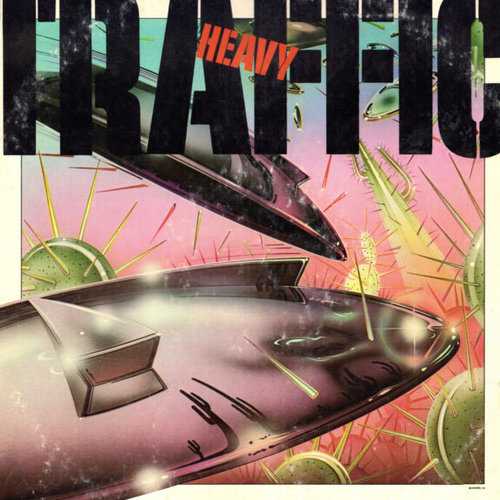 | Album: 11 of 21 Title: Heavy Traffic Released: 1975 Tracks: 10 Duration: 39:13 Scroll: Up Down Top Bottom 25% 50% 75% Spotify Allmusic AlbumCover | 1 Dear Mr. Fantasy (05:30) 2 Forty Thousand Headmen (03:15) 3 Smiling Phases (02:42) 4 Shanghai Noodle Factory (05:06) 5 Paper Sun (03:23) 6 Feelin’ Alright (04:18) 7 Heaven Is in Your Mind (04:02) 8 Medicated Goo (03:36) 9 Coloured Rain (02:43) 10 Empty Pages (04:36) |
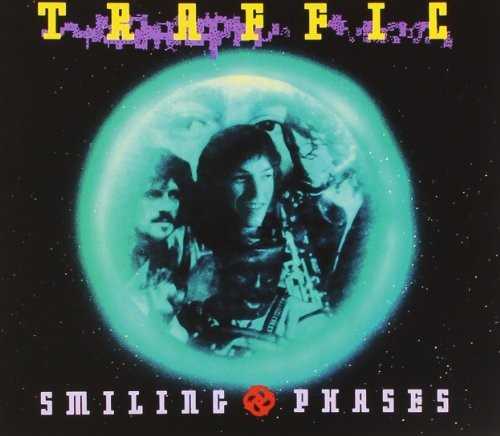 | Album: 12 of 21 Title: Smiling Phases Released: 1991-11-19 Tracks: 26 Duration: 2:03:15 Scroll: Up Down Top Bottom 25% 50% 75% Spotify Allmusic AlbumCover | 1 Paper Sun (04:15) 2 Hole in My Shoe (03:03) 3 Smiling Phases (02:42) 4 Heaven Is in Your Mind (04:18) 5 Coloured Rain (02:43) 6 No Face, No Name, No Number (03:33) 7 Here We Go Round the Mulberry Bush (02:40) 8 Dear Mr. Fantasy (05:37) 9 You Can All Join In (03:37) 10 Feelin’ Alright (04:18) 11 Pearly Queen (04:20) 12 Forty Thousand Headmen (03:15) 13 Vagabond Virgin (05:22) 14 Shanghai Noodle Factory (05:06) 15 Withering Tree (03:04) 16 Medicated Goo (03:36) 1 Glad (06:59) 2 Freedom Rider (05:29) 3 Empty Pages (04:36) 4 John Barleycorn (06:24) 5 The Low Spark of High Heeled Boys (11:40) 6 Light Up or Leave Me Alone (04:46) 7 Rock and Roll Stew (04:21) 8 Shoot Out at the Fantasy Factory (06:05) 9 Walking in the Wind (06:54) 10 When the Eagle Flies (04:23) |
| Smiling Phases : Allmusic album Review : During their tumultuous existence between 1967 and 1974, Traffic had two distinct phases separated by a year (January 1969 to February 1970) during which the band was temporarily dissolved. In its first phase, Traffic was heavily influenced by the pop psychedelia of its time, but were also developing a distinctive blues-rock jam style. When Steve Winwood reconvened the group in 1970 without Dave Mason, he was ready to take the spotlight more forcefully, and Traffic evolved into a band that played long, largely instrumental songs. In constructing a two-CD retrospective of Traffic, compiler Kevin Patrick has taken the obvious step of devoting disc one to the early phase of Traffic and disc two to the later one. He faces different challenges in selecting tracks for each disc. The first CD is necessarily diverse; the early singles must be included, and so must some of Dave Masons material, though his songs tend to sound more like solo tracks. The challenge for disc two is simply that the songs from 1970-1974 tend to be so long, and its difficult to decide which ones to include. Patrick has met both of these challenges admirably. Though both discs are a bit short by CD standards, running a little over an hour each, there are few significant tracks that are missing. On disc two, Patrick has striven to be fair to the later Traffic albums, even though they are not as good as their predecessors from this phase, but he strikes a reasonable balance. Until 1991, Traffic had had no more than a few single-disc compilations, the most readily available being The Best of Traffic, which contained nothing from the groups later period. So, Smiling Phases was a welcome addition to the catalog, with solid selection and sequencing. | ||
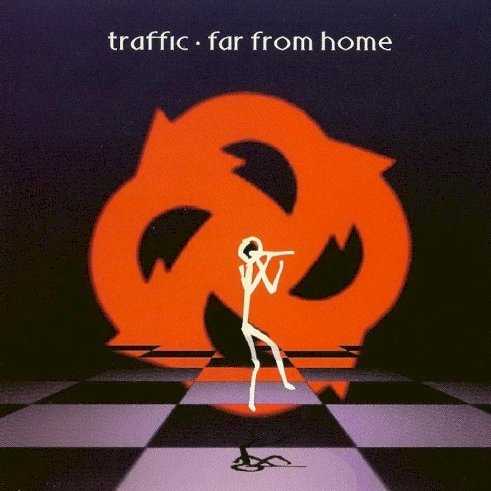 | Album: 13 of 21 Title: Far From Home Released: 1994-05-03 Tracks: 10 Duration: 1:02:19 Scroll: Up Down Top Bottom 25% 50% 75% Spotify Wikipedia Allmusic AlbumCover | 1 Riding High (05:33) 2 Here Comes a Man (05:08) 3 Far From Home (08:36) 4 Nowhere Is Their Freedom (07:00) 5 Holy Ground (07:50) 6 Some Kinda Woman (05:28) 7 Every Night, Every Day (05:32) 8 This Train Won’t Stop (05:26) 9 State of Grace (07:18) 10 Mozambique (04:24) |
| Far From Home : Allmusic album Review : It could be argued that, in its most basic form, Traffic was a vehicle for the songs of Steve Winwood and Jim Capaldi, who wrote most of the material and on some tracks were the only musicians performing. But the question of whether Winwood and Capaldi could validly constitute Traffic by themselves was not addressed until 1994, 20 years after the group disbanded, when the two surprisingly announced they would be recording and touring under their old band name. The album they made together sounded for the most part like a Winwood solo album. He played most of the instruments and sang (Capaldi drummed and sang occasional backup vocals), and he didnt show much interest in the lengthy instrumental passages that characterized Traffic in its heyday. Winwood, the composer, had simply moved on from that old style, and since the new Traffic wasnt a band in any real sense, its sound reflected his contemporary concerns. But if you listened to the lyrics, written by Capaldi, you did hear traces of the old Traffic. Granted, lyrics were not among Traffics strong suits, but Capaldi, in his sometimes roundabout way, did have certain continuing concerns -- a generalized sense of spirituality, a tendency to give advice, and a rejection of the negative aspects of modern society. Winwood may have wished to return to music of greater substance, and if so, he got what he wanted; Far from Home certainly explored weightier topics than a Steve Winwood album. But Capaldi hadnt really improved as a writer over the years, and the final product still worked better musically than lyrically, and, to most ears, didnt really sound like a Traffic album. The resulting confusion kept the album from having much commercial impact. | ||
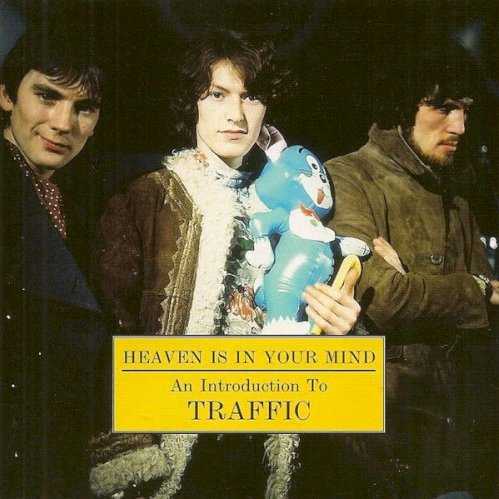 | Album: 14 of 21 Title: Heaven Is in Your Mind: An Introduction to Traffic Released: 1998-11-02 Tracks: 12 Duration: 1:16:29 Scroll: Up Down Top Bottom 25% 50% 75% Allmusic AlbumCover | 1 Pearly Queen (04:20) 2 Heaven Is in Your Mind (04:18) 3 Medicated Goo (03:36) 4 Forty Thousand Headmen (03:15) 5 John Barleycorn (06:24) 6 Empty Pages (04:36) 7 Feelin’ Alright (04:18) 8 (Sometimes I Feel So) Uninspired (07:19) 9 Dear Mr. Fantasy (live) (10:48) 10 Light Up or Leave Me Alone (04:46) 11 The Low Spark of High Heeled Boys (11:40) 12 Dream Gerrard (11:04) |
| Heaven Is in Your Mind: An Introduction to Traffic : Allmusic album Review : This is a decent if rather incomplete introduction to legendary British rockers Traffic. The early recordings are fairly documented with "Pearly Queen," "Forty Thousand Headmen," "Feelin Alright," "John Barleycorn (Must Die)," "Medicated Goo," etc. Highlights are the Welcome to the Canteen live version of "Dear Mr. Fantasy" (which sprawls to almost 11 minutes with Dave Mason playing the hell out of his guitar), "Light Up or Leave Me Alone," and, of course, "The Low Spark of High Heeled Boys." Recommended as a most basic introduction to a band that was anything but basic. | ||
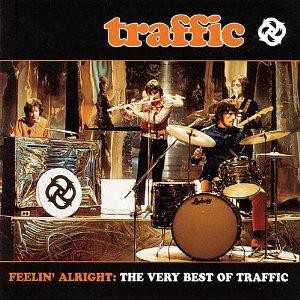 | Album: 15 of 21 Title: Feelin Alright: The Very Best of Traffic Released: 2000-02-08 Tracks: 15 Duration: 1:17:23 Scroll: Up Down Top Bottom 25% 50% 75% Spotify Allmusic AlbumCover | 1 Paper Sun (04:15) 2 Hole in My Shoe (03:03) 3 Heaven Is in Your Mind (04:18) 4 Dear Mr. Fantasy (05:37) 5 You Can All Join In (03:37) 6 Feelin’ Alright (04:18) 7 Pearly Queen (04:20) 8 Forty Thousand Headmen (03:15) 9 Shanghai Noodle Factory (05:06) 10 Glad (06:59) 11 Freedom Rider (05:29) 12 Empty Pages (04:36) 13 John Barleycorn (06:24) 14 Rock and Roll Stew (04:21) 15 The Low Spark of High Heeled Boys (11:40) |
| Feelin' Alright: The Very Best of Traffic : Allmusic album Review : The 2007 Traffic entry in Universal Musics series of best-ofs called The Definitive Collection is simply a retitled reissue of the 2000 compilation Feelin Alright: The Very Best of Traffic. (It even has the same catalog number.) Though the two-CD set Smiling Phases finally put a comprehensive Traffic compilation on the market in 1991, the only readily available single-disc collection had long been Best of Traffic, originally issued halfway through the bands career. Thus, Feelin Alright: The Very Best of Traffic, aka The Definitive Collection, a 77-minute sampler for the CD era, was long overdue. It combines the groups early singles hits like "Paper Sun" and "Hole in My Shoe" with lengthier album tracks like "Dear Mr. Fantasy" and "The Low Spark of High-Heeled Boys." Looking over the song list, any Traffic fan will be able to reel off omissions. But easy as it is to note whats missing, its not so easy to figure out how such songs could be shoehorned into a single-disc set that is already packed with great material. Except in its first year in England, Traffic was not a band that made hit singles, but it did make a plethora of strong recordings, many of which were lengthy by the standards of the time. Several of the absolute necessities on a collection of their best work run longer than five minutes each; "The Low Spark of High-Heeled Boys" runs close to 12 minutes. Beyond those absolute musts are a bunch of other good songs, many more than could fit on one CD. Compilation producer Bill Levenson has made a reasonable choice among them to construct a well-balanced disc that shows off the bands many talents. Neophytes with a few extra dollars to spend are strongly urged to take the plunge and buy Smiling Phases or the more recent two-disc set, Gold, but as a one-CD collection of some of the highlights of Traffics career, this album lives up to its title, either of them. | ||
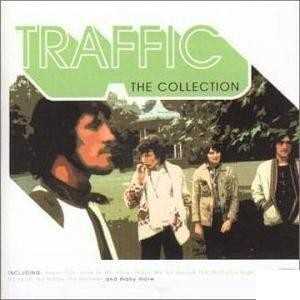 | Album: 16 of 21 Title: The Collection Released: 2001-06-11 Tracks: 17 Duration: 1:12:28 Scroll: Up Down Top Bottom 25% 50% 75% Spotify Allmusic AlbumCover | 1 Low Spark of High Heeled Boys (11:36) 2 Hole in My Shoe (02:53) 3 Dear Mr Fantasy (05:41) 4 You Can All Join In (03:36) 5 John Barleycorn (Must Die) (06:21) 6 Freedom Rider (05:30) 7 No Face, No Name, No Number (03:33) 8 Paper Sun (03:23) 9 Coloured Rain (02:45) 10 Who Knows What Tomorrow May Bring (03:13) 11 Am I What I Was or Am I What I Am (02:34) 12 Medicated Goo (03:36) 13 Berkshire Poppies (02:57) 14 Rock and Roll Stew (04:28) 15 (Roamin’ Through the Gloamin With) 40,000 Headmen (03:16) 16 Pearly Queen (04:21) 17 Here We Go ’Round the Mulberry Bush (02:45) |
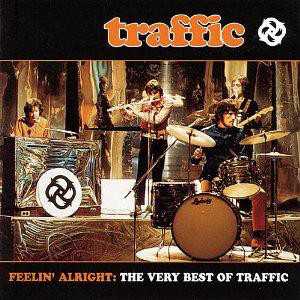 | Album: 17 of 21 Title: The Best of Traffic Released: 2003-05-20 Tracks: 10 Duration: 51:06 Scroll: Up Down Top Bottom 25% 50% 75% Spotify Allmusic AlbumCover | 1 Paper Sun (04:15) 2 Heaven Is in Your Mind (04:18) 3 Dear Mr. Fantasy (05:37) 4 You Can All Join In (03:37) 5 Feelin’ Alright (04:18) 6 Pearly Queen (04:20) 7 Forty Thousand Headmen (03:15) 8 Shanghai Noodle Factory (05:06) 9 Empty Pages (04:36) 10 The Low Spark of High Heeled Boys (11:40) |
| The Best of Traffic : Allmusic album Review : Though Traffic broke up at the start of 1969, the band was on a commercial ascent, which led Island Records, their U.K. label, and United Artists, which licensed their product for the U.S., to assemble a posthumous album, Last Exit, released in April 1969, that, like its predecessor, Traffic, peaked in the American top 20. Meanwhile, former band member Steve Winwood formed Blind Faith, which produced a debut album that topped the charts on both sides of the Atlantic. No wonder Island and UA determined that the fall of 1969 was a good time for a Traffic compilation. The release was especially needed in Britain, where the singles sides "Paper Sun," "Hole in My Shoe," and "Smiling Phases" had not yet appeared on an LP. Since Traffic had moved away from being a singles band after its first year, the album was not dubbed a hits collection, though all its tracks had been released on one side or the other of a single on one side or the other of the Atlantic. As a selection of the best and most popular material from the groups first three albums, the result is hard to fault, though its worth noting that the missing "Here We Go Round the Mulberry Bush," the theme song from the 1967 movie of the same name, was a Top Ten hit in England. Also missing, on the British version of the LP, anyway, was "You Can All Join In," a song that had enjoyed popularity in continental Europe. (The American version did include "You Can All Join In," which replaced "Smiling Phases.") The groups U.K. hit singles, "Paper Sun" and "Hole in My Shoe," were already beginning to sound like quaint bits of psychedelia by 1969, but the entire second side of the LP, comprising "Medicated Goo," "Forty Thousand Headmen," "Feelin Alright," "Shanghai Noodle Factory," and "Dear Mr. Fantasy," was the kind of progressive rock that would define Traffic and give it its place in the rock pantheon. Who could have known when this disc was first released that the bands story was far from over? | ||
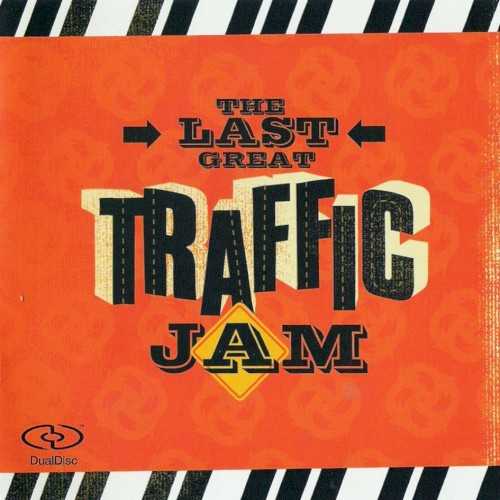 | Album: 18 of 21 Title: The Last Great Traffic Jam Released: 2005 Tracks: 5 Duration: 43:56 Scroll: Up Down Top Bottom 25% 50% 75% Allmusic AlbumCover | 1 Walking in the Wind (07:12) 2 The Low Spark of High Heeled Boys (14:37) 3 John Barleycorn (Must Die) (06:57) 4 Dear Mr. Fantasy (07:44) 5 Gimme Some Lovin’ (07:26) |
| The Last Great Traffic Jam : Allmusic album Review : As a matter of course, one wants to despise records like this. Part of a legendary band reunites 20 years after its dissolution and the death of a founding member (Chris Wood) -- reminiscent of the Who -- and hits the road with audio and video gear in tow for an "historic" tour. In the case of what was left of Traffic -- Steve Winwood and Jim Capaldi -- this isnt the case with their 1994 reunion. The Last Great Traffic Jam offers a document thats worth hearing. The pair hired keyboard giant Randall Bramblett, who also plays saxophones and flute, percussionist Walfredo Reyes, and guitarist/bassist Mike McEvoy. The result is a live Traffic album: the bands best tunes played exceptionally well, and at times even inspired, such as on Brambletts saxophone solo on "Low Spark of High Heeled Boys," or Winwoods guitar break in "Dear Mr. Fantasy," or the soulful versions of "Walking on the Wind" and the rip-up of "Glad." | ||
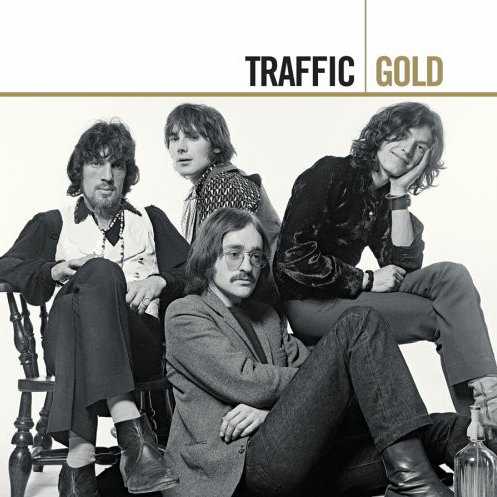 | Album: 19 of 21 Title: Gold Released: 2005-07-26 Tracks: 30 Duration: 2:39:11 Scroll: Up Down Top Bottom 25% 50% 75% Spotify Allmusic Wikipedia AlbumCover | 1 Paper Sun (04:15) 2 Dealer (03:12) 3 Coloured Rain (02:43) 4 Hole in My Shoe (03:03) 5 No Face, No Name, No Number (03:33) 6 Heaven Is in Your Mind (04:18) 7 Smiling Phases (02:42) 8 Dear Mr. Fantasy (05:37) 9 You Can All Join In (03:37) 10 Pearly Queen (04:20) 11 Feelin’ Alright (04:18) 12 Who Knows What Tomorrow May Bring (03:14) 13 Forty Thousand Headmen (03:15) 14 Shanghai Noodle Factory (05:06) 15 Medicated Goo (03:36) 16 Glad (06:59) 17 Freedom Rider (05:29) 18 Empty Pages (04:36) 19 John Barleycorn (06:24) 1 Gimme Some Lovin’ (09:01) 2 The Low Spark of High Heeled Boys (11:40) 3 Light Up or Leave Me Alone (04:46) 4 Rock and Roll Stew (06:09) 5 Rainmaker (07:52) 6 Shoot Out at the Fantasy Factory (06:05) 7 (Sometimes I Feel So) Uninspired (07:33) 8 Something New (03:16) 9 Dream Gerrard (11:04) 10 Walking in the Wind (06:54) 11 When the Eagle Flies (04:23) |
| Gold : Allmusic album Review : After spending the majority of his late-teen years being mistaken -- in the realm of audio -- for Ray Charles, the Spencer Davis Groups "little" Stevie Winwood found himself at the helm of one of the most promising and volatile bands of the late 60/early 70s, Traffic. The initial core foursome of Winwood, Jim Capaldi, Dave Mason, and Chris Wood successfully went from psychedelic art rockers to blues-rock "jamathoners" without losing any momentum, cranking out both concise, pop-oriented radio singles ("Paper Sun," "Dear Mr. Fantasy") and rambling epics ("Low Spark of High-Heeled Boys," "John Barleycorn") with equal amounts of elegance and swagger. Despite numerous lineup changes, side projects, and endless clashes between Winwood and Mason, the group lasted well into the 70s, a good chunk of which appears here on the double-disc, liner-note-heavy Gold. While previous Island collections like Feelin Alright: The Very Best of Traffic and 20th Century Masters - The Millennium Collection dutifully cover the radio essentials, Gold provides both newbies and longtime fans with a fully stocked buffet of fan favorites and album highlights. | ||
| Album: 20 of 21 Title: Icon Released: 2013-01-18 Tracks: 17 Duration: 1:12:18 Scroll: Up Down Top Bottom 25% 50% 75% AlbumCover | 1 Hole in My Shoe (03:03) 2 Paper Sun (04:15) 3 Feelin’ Alright (04:18) 4 Empty Pages (04:36) 5 John Barleycorn (06:24) 6 No Time to Live (05:20) 7 Smiling Phases (02:42) 8 Coloured Rain (02:43) 9 Here We Go Round the Mulberry Bush (02:40) 10 Medicated Goo (03:36) 11 Dealer (03:12) 12 Utterly Simple (03:19) 13 Glad (06:59) 14 Dear Mr. Fantasy (05:37) 15 When the Eagle Flies (04:23) 16 You Can All Join In (03:37) 17 Freedom Rider (05:29) | |
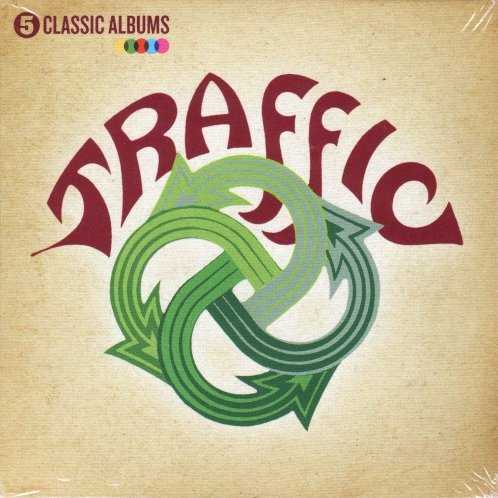 | Album: 21 of 21 Title: 5 Classic Albums Released: 2017 Tracks: 37 Duration: 3:06:35 Scroll: Up Down Top Bottom 25% 50% 75% Allmusic AlbumCover | 1 Heaven Is in Your Mind (04:18) 2 Berkshire Poppies (02:58) 3 House for Everyone (02:04) 4 No Face, No Name, No Number (03:33) 5 Dear Mr. Fantasy (05:37) 6 Dealer (03:12) 7 Utterly Simple (03:19) 8 Coloured Rain (02:43) 9 Hope I Never Find Me There (02:09) 10 Giving to You (04:17) 1 You Can All Join In (03:37) 2 Pearly Queen (04:20) 3 Don’t Be Sad (03:25) 4 Who Knows What Tomorrow May Bring (03:14) 5 Feelin’ Alright (04:18) 6 Vagabond Virgin (05:22) 7 Forty Thousand Headmen (03:15) 8 Cryin’ to Be Heard (05:12) 9 No Time to Live (05:20) 10 Means to an End (02:35) 1 Glad (06:59) 2 Freedom Rider (05:29) 3 Empty Pages (04:36) 4 Stranger to Himself (03:55) 5 John Barleycorn (06:24) 6 Every Mother’s Son (07:06) 1 Hidden Treasure (04:11) 2 The Low Spark of High Heeled Boys (11:40) 3 Rock and Roll Stew (04:21) 4 Many a Mile to Freedom (07:14) 5 Light Up or Leave Me Alone (04:46) 6 Rainmaker (07:38) 1 Shoot Out at the Fantasy Factory (06:05) 2 Roll Right Stones (11:46) 3 Evening Blue (05:19) 4 Tragic Magic (06:43) 5 (Sometimes I Feel So) Uninspired (07:19) |